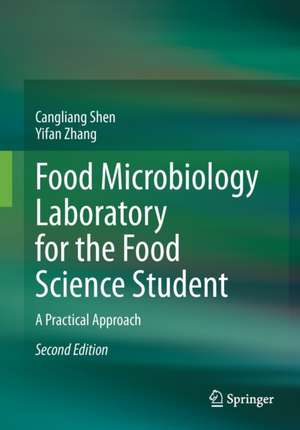Food Microbiology Laboratory for the Food Science Student: A Practical Approach
Autor Cangliang Shen, Yifan Zhangen Limba Engleză Paperback – 25 apr 2023
This book is designed to give students an understanding of the role of microorganisms in food processing and preservation; the relation of microorganisms to food spoilage, foodborne illness, and intoxication; general food processing and quality control; the role of microorganisms in health promotion; and federal food processing regulations. The listed laboratory exercises are aimed to provide a hands-on-opportunity for the student to practice and observe the principles of food microbiology. Students will be able to familiarize themselves with the techniques used to research, regulate, prevent, and control the microorganisms in food and understand the function of beneficial microorganism during food manufacturing process.
The second edition add 5 new chapters including “Chapter 10 -Thermal inactivation of Escherichia coli O157:H7 in mechanically tenderized beef steaks and color measurements”, “Chapter 11-Evaluate antimicrobial activity of chlorine water on apples and measurement of free chlorine concentrations”, “Chapter 12-Evaluate cross-contamination of Salmonella on tomatoes in wash water using most probable number (MPN) technique”, “Chapter 15-DNA extraction and purity determination of foodborne pathogens”, and “Chapter 16-Practice of multiplex PCR to identify bacteria in bacterial solutions”. It also includes new lab work flowcharts for Gram-staining and endospore-staining technology in Chapter 1, pour plating and spread plating in Chapter 3, Enterotube II in Chapter 9, and Kirby Beau test procedure in Chapter 20. It includes a new sample of syllabus with the hybrid teaching of both lecture and lab sections in one course, which will assist junior faculty/instructors to develop similar lecture and lab courses.
| Toate formatele și edițiile | Preț | Express |
|---|---|---|
| Paperback (2) | 393.55 lei 3-5 săpt. | +16.10 lei 7-13 zile |
| Springer International Publishing – 25 apr 2023 | 393.55 lei 3-5 săpt. | +16.10 lei 7-13 zile |
| Springer International Publishing – 23 aug 2017 | 421.71 lei 3-5 săpt. | +80.83 lei 7-13 zile |
Preț: 393.55 lei
Preț vechi: 474.16 lei
-17% Nou
Puncte Express: 590
Preț estimativ în valută:
75.32€ • 81.31$ • 63.16£
75.32€ • 81.31$ • 63.16£
Carte disponibilă
Livrare economică 29 martie-12 aprilie
Livrare express 15-21 martie pentru 26.09 lei
Preluare comenzi: 021 569.72.76
Specificații
ISBN-13: 9783031261961
ISBN-10: 3031261968
Pagini: 160
Ilustrații: XVIII, 160 p. 62 illus., 60 illus. in color.
Dimensiuni: 178 x 254 x 14 mm
Greutate: 0.32 kg
Ediția:2nd ed. 2023
Editura: Springer International Publishing
Colecția Springer
Locul publicării:Cham, Switzerland
ISBN-10: 3031261968
Pagini: 160
Ilustrații: XVIII, 160 p. 62 illus., 60 illus. in color.
Dimensiuni: 178 x 254 x 14 mm
Greutate: 0.32 kg
Ediția:2nd ed. 2023
Editura: Springer International Publishing
Colecția Springer
Locul publicării:Cham, Switzerland
Cuprins
Food Microbiology Laboratory Safety and Notebook Record.- Staining Technology and Bright-field Microscope Use.- Enumeration of Bacteria in Broth Suspension by Spread and Pour Plating.- Isolation of Foodborne pathogens on Selective, Differentiate and Enrich Medium by Streak-plating.- Enumeration of Aerobic plate counts, Coliforms and Escherichia coli of Organic Fruit Juice on Petri-film.- Enumeration and identification of Staphylococcus aureus in Chicken Salads.- Enumeration and identification Listeria monocytogenes on ready-to-eat (RTE) frankfurters.- Isolation and identification of Salmonella and Campylobacter spp. on broiler carcasses.- Thermal inactivation of Escherichia coli O157:H7 in Non-intact reconstructed beef patties.- Thermal inactivation of Escherichia coli O157:H7 in mechanically tenderized beef steaks and color measurements.- Evaluate antimicrobial activity of chlorine water on apples and measurement of free chlorine concentrations.- Evaluate cross-contamination of Salmonella on tomatoes in wash water using most probable number (MPN) technique.- Cultivation of Anaerobic Bacteria in Canned Food.- Observation and enumeration of Molds from Spoiled Bread.- DNA Extraction and Purity Determination of Foodborne Pathogens.- Practice of Multiplex PCR to identify bacteria in bacterial solutions.- PCR Identification of Listeria monocytogenes in Deli Meat.- Cheese Making and Characterization.- Wine and Sauerkraut Making and Characterization.- Introduction of oral presentation and job interview preparation.- Appendix- Samples of Food Microbiology Lab Course Syllabus.
Notă biografică
Dr. Cangliang Shen is an Associate Professor/Extension Specialist at Davis College, Division of Animal & Nutritional Sciences and Family & Community Development, West Virginia University. Dr. Shen worked at IEH Consulting Groups (Research Associate), USDA-ARS (Postdoctoral Research Microbiologist), and Western Kentucky University (Assistant Professor) after obtaining his Ph.D. from Colorado State University. Dr. Shen is currently teaching General Microbiology, Food Microbiology Lab, and Food Chemistry courses. Dr. Shen’s research interest is in developing postharvest sanitizing procedures for reducing microbial food safety risks on poultry meat products and fresh produce. Dr. Shen has published 49 peer-review journal articles, 2 textbooks, and 2 book chapters, and secured USDA-NIFA grants over $3.0 million. Dr. Shen serves as the editorial board member of Journal of Food Protection and Food Protection Trends. Dr. Shen received Outstanding Volunteer Award of Food Microbiology Division-Institute of Food Technologists (IFT) in 2018. He was the Chair of Food Microbiology Division-IFT in 2019-2020 and he is the Chair of Biotechnology Division-IFT in 2022-2023.
Textul de pe ultima copertă
This book is designed to give students an understanding of the role of microorganisms in food processing and preservation; the relation of microorganisms to food spoilage, foodborne illness, and intoxication; general food processing and quality control; the role of microorganisms in health promotion; and federal food processing regulations. The listed laboratory exercises are aimed to provide a hands-on-opportunity for the student to practice and observe the principles of food microbiology. Students will be able to familiarize themselves with the techniques used to research, regulate, prevent and control the microorganisms in food and understand the function of beneficial microorganism during food manufacturing process
Caracteristici
Includes Isolation/identification of beneficial bacteria during food processing Covers food quality analysis in lab exercises in addition to microbial analysis Introduces small scale research projects
